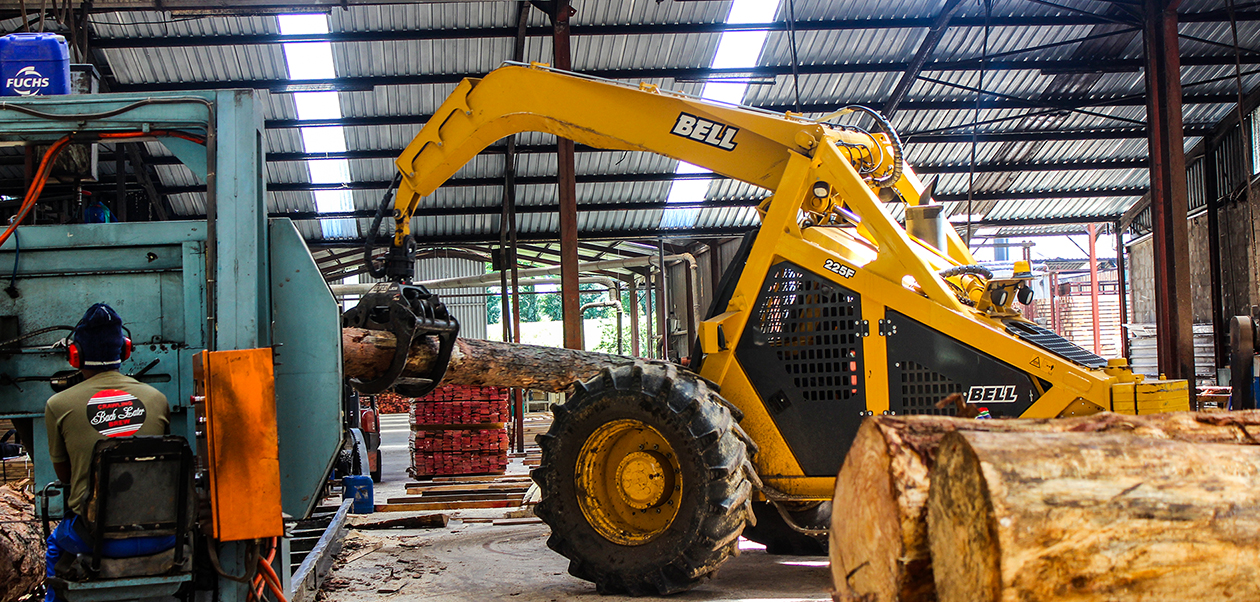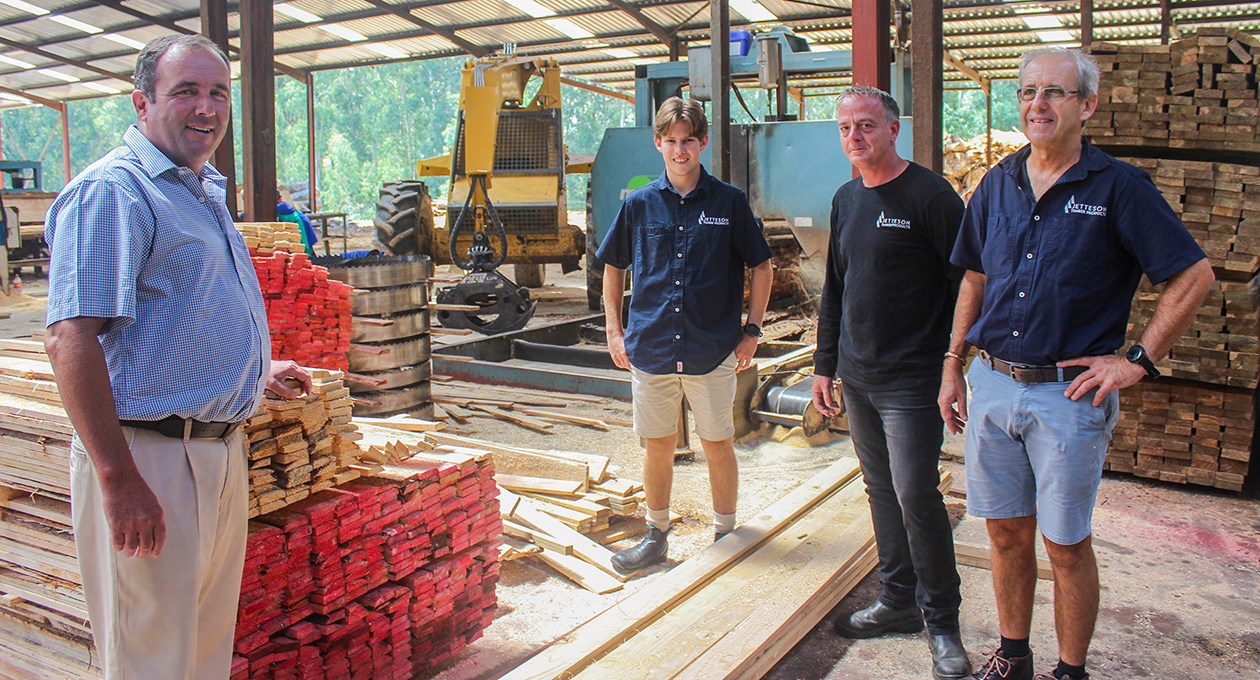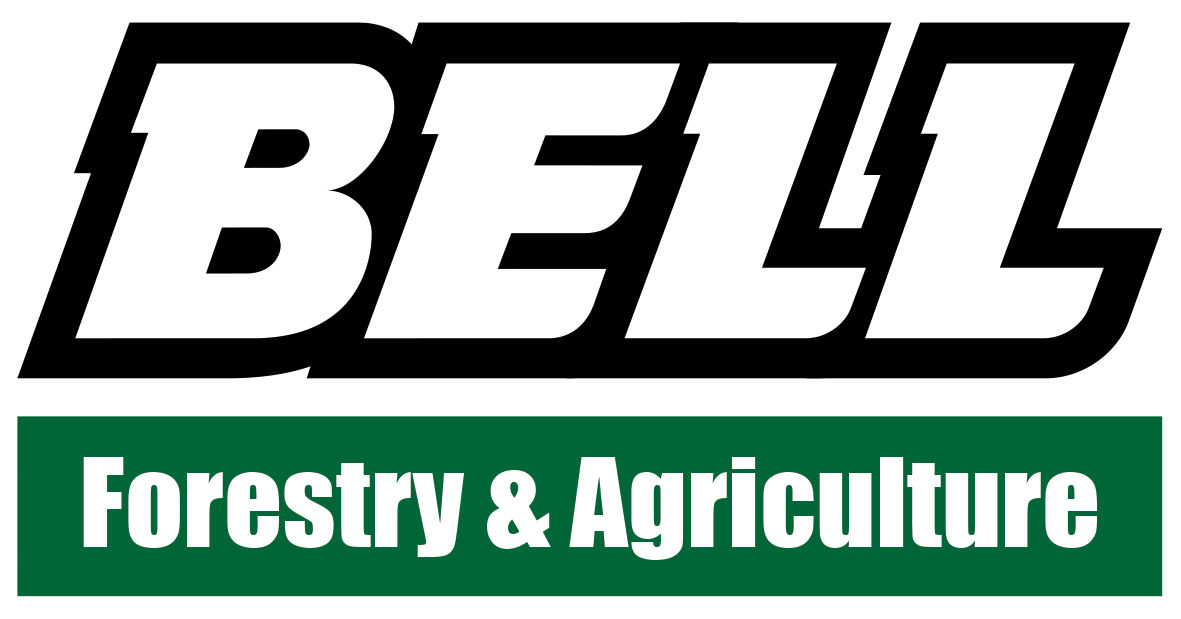Jetteson Timbers invests in four new Bell Loggers
Published: 03 June 2024

Nestled in the picturesque KwaZulu-Natal Midlands area of Karkloof is Jetteson Timbers, a quintessential family-owned and operated business. At the helm is Brendon Raw, who is living proof that hard work creates opportunity and you don’t have to be booksmart to be successful.
Brendon grew up in Karkloof, outside Howick, where his parents owned 90 hectares of land with a trading store. He had always been drawn to the practicalities of life rather than scholarly pursuits, so after completing school and his army conscription, he was eager to start working. He began running the family trading store with Ninette, whom he had met during his time in the army, and later married.
The partnership has been incredibly fruitful as they have grown an impressive business while raising a family. Their daughter, Justine, now lives in the Cape and works as a marketer in the wine industry. Hayden, their son, is completing a BCom Business Management degree and has recently moved home to work as a Junior Manager at Jetteson Timbers.
Brendon recalls that an opportunity to fell wattle for two farmers got him involved in timber contracting, starting out with only a chainsaw and tractor. “We grew from there into a reasonable contracting business that, at one stage, was harvesting 10 000t of timber per month, running a day and a night shift, seven days a week. It was nightmare stuff.
“Then I started sawmilling in a small way about 20 years ago, and that grew and overtook the contracting business. We phased out contracting and started buying blocks of timber and harvesting for our own sawmill.”
Today, the company employs about 130 people and does everything inhouse, including transporting their own timber and finished products. Controlling every aspect of the business simplifies life, which Brendon says is “challenging enough with everything we do”.
The harvesting business still supplies the sawmill, but Jetteson Timbers now owns about 2 500 hectares of land and grows its own timber on 1 000 hectares of gum and pine plantations. This comprises Tweefontein farm in the Karkloof area and two farms further away in the Kamberg.
The mill processes about 65 cubic metres of pine per day, which includes both structural and industrial pine. All the timber is kiln dried and the industrial timber for pallets is sold in Pietermaritzburg, Cato Ridge and, to a lesser degree, Durban. About 80% of the structural timber products are sold to Timber Solutions in Howick, which Brendon started 12 years ago and later sold to his nephew, who has built up the business. Gum is sold to a veneer plant in Estcourt.

Brendon’s relationship with Bell goes way back. “It’s probably been 25 years since I bought my first Bell Tri-Wheeler for timber contracting,” he says. “For a long time now, we’ve had nine in our fleet and that just works for us. Four of them work at the sawmill and five are on the farms.”
The four new Bell 225F Loggers were purchased to replace old A-series machines that were around 15 to 18 years old and had clocked between 15 000 to 30 000 hours. The first machine was delivered to Tweefontein in June 2023, the second and third units went to the Kamberg and the mill respectively in July and August, and the fourth machine also went to the Kamberg in February 2024. The machines were supplied with anti-siphon devices in the diesel tanks to guard against fuel theft.
“We put two new machines in the Kamberg because it’s so far away and I know for the next five years, at least, I’m not going to have problems with those machines like pipes bursting and breakdowns,” Brendon explains.
The Loggers on the farms generally work seven to eight hours per day pulling trees to a central site, sorting, stacking, and loading trucks. They handle about 50t of timber per day, which can be 5,2m or 2,5m lengths depending on market needs at the time.
Brendon is full of praise for his old workhorses: “Those old Loggers with the Vickers pumps were the best Loggers Bell have ever made in my mind. So easy to fix; you can fix a wheel motor or a pump in two to three hours. You don’t need a specialist, and you can fix it in the plantation, wherever, it’s easy.”
However, he is grateful for the improvements on the F-series: “There are so many advantages with these new ones. The big thing is safety, and I bought the 225Fs with operator doors for that reason.”
Brendon appreciates the lower centre of gravity, due to the weight transfer with the diesel tank positioning and the wider wheelbase, as further safety improvements making the machine more stable. And, with an average fuel burn of 4,5 to 5 litres and hour, the new F-series machines run on about a litre an hour less fuel than their A-series counterparts, and much quieter due to the water-cooled engine.
“They are a lot more complicated, but I have faith that they will last just as long,” he says. The longevity of his old machines he attributes to servicing every 250 hours. “All those that we sold were still fine, they weren’t losing oil. The key is servicing. Oil and filters are cheap; it’s just the time.”
Bell will service the new Loggers every 500 hours in the warranty period, and this aligns with Jetteson Timbers, which now services their machines every 500 hours after switching to semi-synthetic oil. “We’ve done that across the board for every vehicle we own because with these new oils you can service every 500 hours with no problem. The semi-synthetic oil isn’t that much more expensive but you’re saving yourself all that time for servicing, the cost of oil and filters, and the mechanic’s time. It’s made a huge difference from a mechanic that is servicing madly every 250 hours to now being able to do other things.”
As the company continues to develop, Brendon remains focused on simplifying operations and maximising sustainability, which includes responsible forestry practices to preserve the soil for future generations. This dedication to quality and self-reliance is sure to see Jetteson Timbers grow to be as enduring as the trees themselves.

